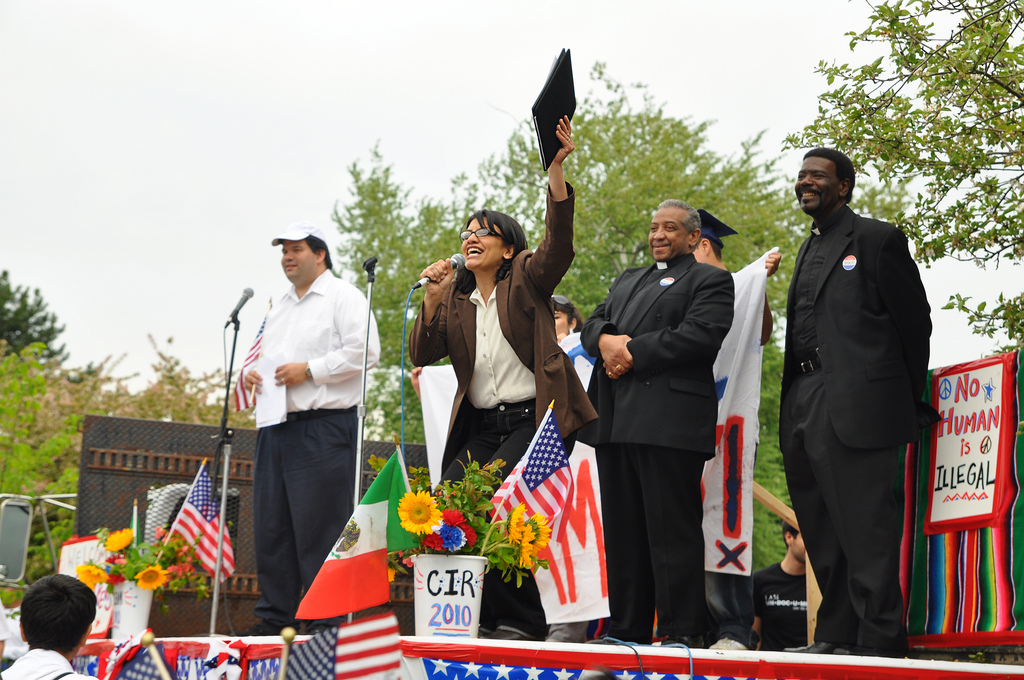The debate is on! Two articles are up on Altmuslimah, each taking one of two sides on this controversial contemporary issue – should Muslim-Americans support same-sex marriage or not?
No doubt, the debate is going to provoke lots of commentary. Interestingly, a number of the comments seem to converge on this basic viewpoint: that while we may not agree with same-sex marriage, the secular state ought to recognize such marriages and let gay couples enjoy the right to be married. Just as Mormons and Seventh-Day Adventists, like Muslims, prohibit alcohol in their religions while still managing to coexist with the fact that alcohol is legal, albeit regulated, so too can they disagree with gay marriage theologically, but not stand in the way of its legalization as the Christian Right is doing.
In fact, Sabir Ibrahim argues that it would be politically unwise to join forces with the Christian Right. Just as Muslims can dislike gay marriage, they can like some of the things that the Christian Right stands for – such as family values and clean living – but not act on these shared values and seek an ally in the most vocal right-wing Christian groups. The Christian Right has, more often than not, been no friend of Muslims.
You can make the case for gay marriage by arguing that the secular government has no business meddling in our personal affairs, like who we marry or if a woman has a baby out of wedlock, to the extent these personal matters do not affect the public good. Yet even though the State of California opened up another avenue toward marriage (i.e., it’s not just for heterosexual couples anymore), the state government is still regulating morality. A twelve-year-old cannot get married. A marriage between a brother and sister is not legally recognized, and neither is polygamy. And straight couples who cohabit don’t have the same rights as married people, like shared property rights. Should the state get involved in these matters just as it has with same-sex marriage?
Most of us would agree that brothers and sisters should not have the right to marry. (Although if religion is not to dictate how we formulate policy, well then, on what do you base the prohibition of brother-sister marriage? Just the fact that “it’s wrong?” Okay, but what makes it wrong if brother and sister are consenting adults?) And in the context of postindustrial Western society, we probably wouldn’t want to give minors the right to marry. But polygamy and cohabitation are rather interesting cases. One is permitted in Islam, the other forbidden. If gay couples want to marry and have the same rights as monogamous straight couples, like joint tax filing and funeral leave benefits, those Mormons and Muslims who practice polygamy could make the same case too.
An article about husband-sharing actually did come out on altmuslimah back in July. Statements about a “husband’s natural bent toward polygyny” and jealousy “expos(ing) a woman’s insecurity” may have detracted from the overall point of the article!) that in some cases, maybe monogamy isn’t for everyone, especially “for the women who are looking to marry, yet, for a variety of reasons, have not found a worthy single man with whom to unite in marriage.” There are Muslim women, even here in the United States, who believe that there aren’t a lot of suitable men to go around, and perhaps sharing one of the “good men” is the closest she’ll come to having what she wants – a decent marriage. You don’t have to agree with polygamy, just like you don’t have to agree with gay marriage – but if personal beliefs are not to be the basis for policymaking, then what do governments who allow gay marriage have against sanctioning polygamy?
And what of cohabiting couples? It’s a bit ironic that gay couples want to marry precisely so that they’re not treated as cohabiting couples with no legal standing, while there are long-term straight couples who have the option to marry but don’t. According to a 2006 article from The Daily Mail, unmarried couples in the United Kingdom have been given legal rights to shared property and income – in other words, some of the same rights as married couples. Should cohabiting couples in America be given a set of legal rights? Well, cohabiting couples do not (always) intend to marry. So giving legal protection and support to cohabiting couples, unlike to gay couples or polygamous households, would be treating them like married couples without them even marrying in the first place! Where is the distinction between being married and just living together?
Maybe some Muslim Americans don’t want to support same-sex marriage because they believe that allowing it would open the door to other “slippery slope” issues. Be that as it may, we are going to be divided over whether or not we should support the legalization of same-sex marriage, in a secular context. Some of us may argue, “Same-sex marriage is a private affair that doesn’t affect the public good, we can support it without partaking in it ourselves.” And some of us may argue, “To support even a secular policy in favor of same-sex marriage, is to support a sinful behavior and go against religious principle.” Either way, what the debate boils down to is making sense of what it means to be Muslim Americans in the first place, and what it means to maintain our faith in a pluralistic society of all different faiths, cultures, and ideologies. Christian Americans, too, are grappling with this; they do not live the same reality as Catholics in Catholic-majority Poland or Chile. Or for that matter Muslims in Muslim-majority Algeria or Pakistan. In all likelihood, gay marriage isn’t a hot social topic in Muslim countries, where many people are facing general poverty and political instability. As one woman from Amnesty International puts it: “When you are not struggling to survive is when you get a chance to think about who you are and how you would like to live your life.”



